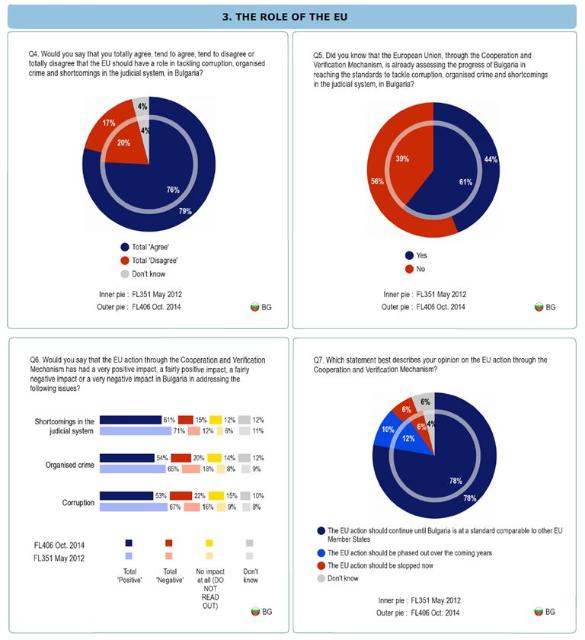EU News
|
|
EC reports on progress in Bulgaria under the Co-operation and Verification Mechanism
The Commission issued yesterday its analysis of the steps Bulgaria has taken in the past twelve months in the areas of judicial reform and the fight against corruption and organised crime, under the Co-operation and Verification Mechanism (CVM). The report shows that – given the political uncertainties the country experienced in the past year – progress has been slow and further steps are needed.
First Vice-President Timmermans said, "Political uncertainties and other challenges in the past year have made the task of reform difficult in Bulgaria. Yet it is a positive sign that in a number of areas, problems have been acknowledged and solutions are being identified. It's now time to act. The reforms identified in our report will help gain the confidence of citizens and of those who want to invest in the country.
Bulgaria is home to talented and hard–working people who want to see change happen and take root. The Cooperation and Verification Mechanism remains a valuable instrument to spur progress and it is supported by a majority of Bulgarians. Now is the time to build political consensus to accelerate reforms".
This report assesses the progress made by Bulgaria. Overall, progress has been slow in the past year. The fact that the period covered by this report saw three different governments and a deadlocked parliamentary situation has clearly contributed to a lack of resolve to reform. Taking reform forward requires acknowledging the problems and identifying measures to remedy them. In this respect, the current government and the Parliament have taken an important step by adopting a judicial reform strategy setting out directions for future work in a number of areas. These will need to be followed up and implemented for change to be convincingly shown.
Since the Commission's last report in January 2014 some of the key institutions have continued to develop managerial changes. This should support the effort to carry reform through into change on the ground. Examples are the Supreme Judicial Council's analysis of workload in courts and prosecution offices and the implementation of the Prosecutor General's reform of the prosecution offices, which are now near to completion.
However, on important issues such as ensuring the random allocation of cases and fair appointments to important judicial posts, the actions of the responsible national institutions continue to lack the determination needed to inspire confidence. Responses to the well-known problems in area of corruption and organised crime have remained piecemeal and lacking in overall strategic direction. There are very few examples where high-level cases of corruption or organised crime have been brought to conclusion in court.
The Commission believes that the monitoring process of the CVM, the opportunities provided by EU funds and the constructive engagement of the Commission and many Member States continue to provide valuable support to Bulgaria's efforts. This is an assessment shared by citizens in Bulgaria: a newly published Flash Eurobarometer, conducted in November 2014, shows that 79% of citizens in Bulgaria agree that the EU should have a role in tackling corruption, organised crime and shortcomings in the judicial system; 61% of Bulgarians think the EU has had a positive impact on judicial shortcomings and over 50% believe that is has had a positive impact on organised crime and on corruption (see Annex).
The Commission invites Bulgaria to accelerate progress on its recommendations on the reform of the judiciary and the fight against corruption and organised crime. The next formal report is likely to come in around one year's time.
Background
On 1 January 2007, the Commission established a Cooperation and Verification Mechanism to assess the commitments made by Bulgaria in the areas of judicial reform and the fight against corruption and organized crime. The Commission was asked to report on progress in these areas on a regular basis. The Commission issued its first report on 27 June 2007. The Commission reports are complemented by a staff-working document which sets out the Commission's detailed analysis against each of the benchmarks set for the CVM.
The last annual report was published on 22 January 2014.
The Commission's analysis is based on an assessment of progress by the Bulgarian authorities and on information by Member States, international organisations, independent experts and a variety of other sources. The Commission has carried out several missions to Bulgaria, and the reports also take into account the responses by Bulgaria to detailed questionnaires prepared by the Commission. A detailed summary is provided in a staff working document.
Memo on 2015 CVM Report for Bulgaria MEMO/15/3825
Annex

Source: Flash Eurobarometer 406, Bulgaria Factsheet
The report is available on the following website:http://ec.europa.eu/dgs/secretariat_general/cvm/index_en.htm


.gif)